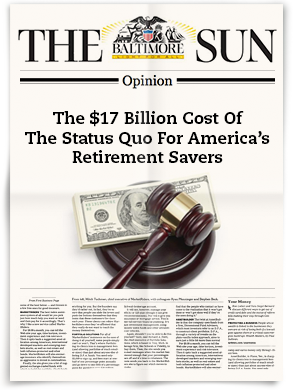
The following opinion editorial, originally published in The Baltimore Sun, was co-authored by Rebalance Managing Director Scott Puritz and a key member of the firm’s Investment Committee, financial luminary Charley Ellis. The editorial examines a proposed U.S. Department of Labor rule designed to make retirement investing safer.
You can hardly blame an industry for defending the status quo when it allows them to rake in $17 billion a year in profits that would otherwise be off limits. But that narrow self-interest is by no means a compelling argument for the rest of us who lose those billions of dollars in the process.
Ronald Reagan once famously joked that “status quo” is Latin for the “the mess we are in.” A very clear case in point is the current debate in Washington, D.C. about requiring brokers to start putting the interests of their clients first.
The U.S. Department of Labor has proposed a “fiduciary rule” that would require all financial professionals to stop giving conflicted (i.e. self-serving) advice when it comes to retirement investments. The financial industry’s case against the rule boils down to this: It will make it more expensive and less profitable for them to provide advice to retirement savers so fewer people will be willing to provide it.
Experts dispute that, but there is no doubt that leaving things the way they are now is much more expensive for America’s millions of retirement savers.
Here’s the problem: Savers — small and large — often have to rely on advisers to understand their options regarding investing their retirement savings. Outdated Labor Department rules have allowed brokers, insurance agents, and others offering retirement investment advice to put their own interests ahead of their clients’ best interest. Such investments generate handsome commissions for them but saddle innocent clients with high fees and poor returns. The annual cost of conflicted investment advice is estimated to be $17 billion – money that is going from the retirement accounts of average Americans and into the pockets of financial professionals.
The end result of all that conflicted advice is that millions of Americans end up with smaller nest eggs for their golden years. They will run out of money sooner or be able to do less in retirement … or both. Some unfortunate savers end up losing much, or even all, of their nest egg when conflicted advice puts them in inappropriately risky investments with high fees. The situation is made much worse when brokers, insurance agents and others try to pass themselves off as investment advisors, who are required to honor a “fiduciary duty” to their clients.
The good news is that the Labor Department’s proposed rule change tackles the problem head on, requiring anyone giving retirement investment advice to act in the best interest of their clients and comply with what’s known as their fiduciary duty. But brokers and others in the financial industry are fighting hard against the rule to preserve their old way of doing business—and the hefty fees they can earn at the expense of their clients. One of their main talking points is that the rule will actually hurt everyday investors – especially middle income savers – by making it unprofitable for brokers to offer advice to modest account holders under the best interest standard.
The truth is that many U.S brokerage firms in the U.S. are designed to harvest maximum profit. It should come as no surprise that their business model won’t work in a world where they have to put the interests of retirement savers first. But that doesn’t mean that there are not good options available today for individuals who want help.
Using technology-based platforms, a new generation of firms is now offering retirement investment advice to clients all across the income spectrum for very modest fees. They include Wealthfront, and our firm, Rebalance, among others. This new generation of tech-driven advisory services is finding ways for retirement savers to lower their investment costs.
What’s driving this evolution in the retirement financial advice industry?
It’s fairly simple. By harnessing efficient modern technology to cut costs by over 50%, the new generation of advisory services has discovered that it is possible to do the right thing by their clients and still run a profitable company. In fact, we’ve seen many savers reach out to us for help after working with a broker-dealer, paying high fees, and ending up with little to show in returns on their retirement investments.
It’s time to hold all financial professionals accountable by consistently requiring them to act in the best interests of their clients. That’s what the DOL rule can do. Americans struggling to save for a dignified retirement should no longer be subjected to the conflicts of interest that are bleeding off their savings. And, if traditional brokerage firms can’t live with the simple fiduciary standard and refuse to serve modest savers, so be it. Other financial professionals on and off the Web who embrace the client-first approach stand ready to help all Americans prepare for a secure retirement.
We can do better than a status quo that imposes a “tax” of $17 billion per year on American retirees. We don’t have to settle for “the mess we are in” when it comes to the financial wellbeing of the retirement savers of America.
Dr. Ellis is the former Chairman of the Yale Endowment Investment Committee. Mr. Puritz is the Managing Director of Rebalance, a technology-enhanced national investment service.





